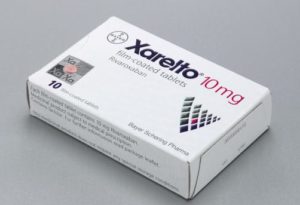A recent Danish study, examining a nationwide cohort of 8,187 patients with venous thromboembolism (VTE) treated with one of two new oral anticoagulant therapies, reports no significant differences between the drugs in risk of all-cause mortality, recurrent VTE or hospitalised bleeding.
The study by Caroline Sindet-Pedersen and colleagues has been published in the European Heart Journal, and includes all Danish residents with an inpatient or outpatient diagnosis of deep vein thrombosis or pulmonary embolism between 1 January 2015 and 30 June 2017, who were also prescribed medical therapy of either apixaban or rivaroxaban, within a week following their diagnosis. Apixaban and rivaroxaban are both novel oral anticoagulants (NOACs), which in contrast to warfarin—a widely used anticoagulant—are non-vitamin K antagonists. Other such NOACs, including dabigatran and edoxaban, were not examined in this study, and patients prescribed with any NOAC other than either rivaroxaban or apixaban, or with a vitamin K antagonist drug, were excluded from the analysis.

Based on these exclusion criteria as well as a range of others (e.g. patients with atrial fibrillation or mechanical heart valves), the cohort was reduced from a total 12,130 patients with VTE to the final population of 8,187. Of these, 1,504 (18%) were treated with apixaban while 6,683 (82%) were treated with rivaroxaban.
“We found no significant differences in a nationwide cohort of VTE patients treated with rivaroxaban or apixaban regarding the short term risks of all-cause mortality, recurrent VTE, or hospitalised bleeding”, Sindet-Pedersen et al write. “Our study compared rivaroxaban and apixaban, using an observational study design, and gives an insight into the absolute risks of recurrent VTE and bleeding when rivaroxaban and apixaban are used in the everyday clinical practice.”
 The results showed markedly similar outcomes for the two groups, with recurrent VTE rates at 180 days for 2.16% in the apixaban group (95% CI, 4.08–6.08%) and 2.22% in the rivaroxaban group (95% CI, 1.89–2.52%). Hospitalised bleeding at 180 days was seen in 1.73% (95% CI, 1.22–2.35%) of patients with apixaban versus 1.89% (95% CI, 1.56–2.20%) of patients with rivaroxaban, and all-cause mortality was 5.08% (95% CI, 4.08–6.08%) in the apixaban group and 4.6% (95% CI, 4.13–5.18%) in the rivaroxaban group. While still far from a significant difference, the authors suggest that the difference in all-cause mortality may be affected by “major differences” observed between the groups, with an older and more comorbid patient population in the apixaban cohort. “Thus it may be”, Sindet-Pedersen et al add, “that patients in the apixaban group also had a higher risk of bleeding.”
The results showed markedly similar outcomes for the two groups, with recurrent VTE rates at 180 days for 2.16% in the apixaban group (95% CI, 4.08–6.08%) and 2.22% in the rivaroxaban group (95% CI, 1.89–2.52%). Hospitalised bleeding at 180 days was seen in 1.73% (95% CI, 1.22–2.35%) of patients with apixaban versus 1.89% (95% CI, 1.56–2.20%) of patients with rivaroxaban, and all-cause mortality was 5.08% (95% CI, 4.08–6.08%) in the apixaban group and 4.6% (95% CI, 4.13–5.18%) in the rivaroxaban group. While still far from a significant difference, the authors suggest that the difference in all-cause mortality may be affected by “major differences” observed between the groups, with an older and more comorbid patient population in the apixaban cohort. “Thus it may be”, Sindet-Pedersen et al add, “that patients in the apixaban group also had a higher risk of bleeding.”
Expanding on what the authors perceived to be the major limitations of the study, they note: “Significantly more patients in the apixaban group had pulmonary embolism as index event. This can possibly be explained by pulmonary embolism being a condition that affects more elderly patients, thus because patients in the apixaban group were older than the patients in the rivaroxaban group, this can explain the difference. However, we adjusted for these major differences in age and comorbidities, and thus, within the limitations of correct specifications of our models, these differences should not bias our results.
“Another limitation is the potential for residual confounding as potential confounders were not available in the registries. These include: body mass index, smoking status, and important clinical parameters such as eGFR, hepatic status, blood pressure, and lipid status. This argues for a head-to-head randomised trial, which could provide more causal results. Such a study has been scheduled and will be of high relevance to both the medical field and patients.”









